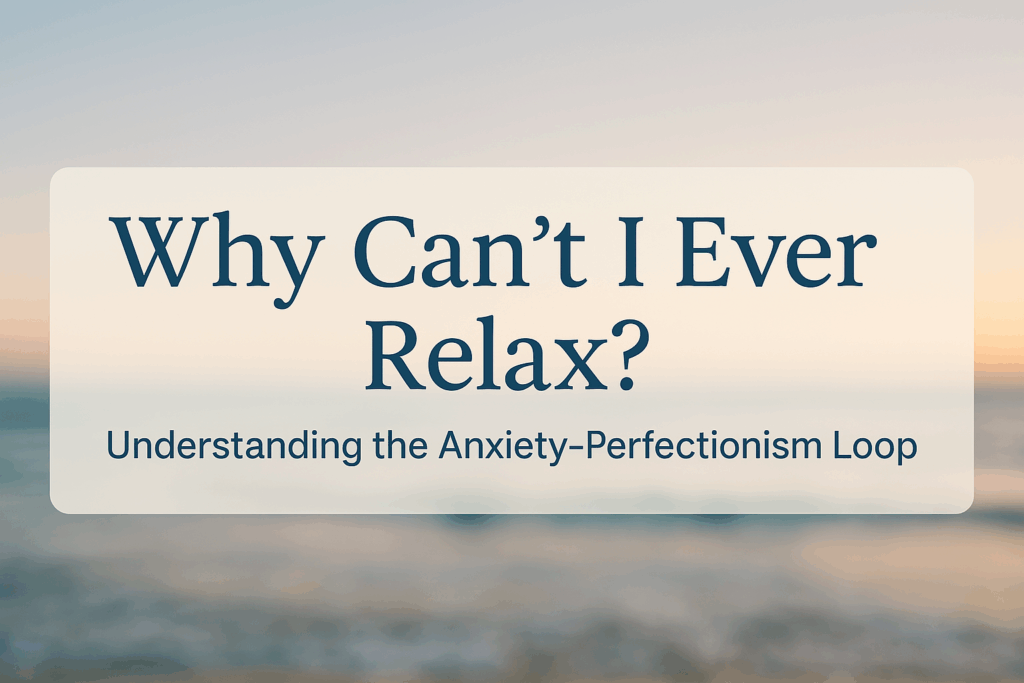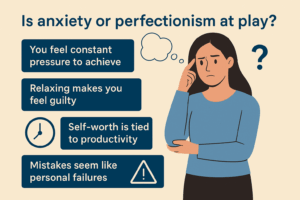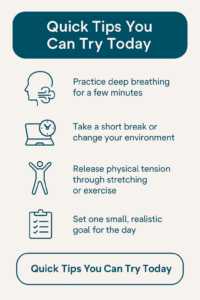It’s Friday night. Your to-do list is finished, the dishes are done, and there’s nothing urgent on your calendar. You should be able to sink into the couch, watch a movie, or simply enjoy the quiet.
But instead, your mind is racing. You’re replaying conversations from earlier in the week, thinking about what you need to do tomorrow, and feeling strangely restless — almost guilty — for not doing something “productive.”
If this sounds familiar, you’re not alone. Many people in Vancouver, Coquitlam, and across BC struggle to truly relax, even when there’s nothing left on their immediate plate. This constant state of tension can be a sign of a deeper cycle involving anxiety and perfectionism.
Why Can’t I Relax at Night? The Anxiety–Perfectionism Connection
Anxiety is your body’s way of preparing for a threat — but in our modern world, that “threat” might be an email you forgot to send, a project deadline, or the fear of making a mistake.
When perfectionism enters the picture, it can trick your brain into believing you always need to be doing something. This keeps your nervous system in fight-or-flight mode, even during downtime. You never get the “all clear” signal to rest.
Common perfectionistic thoughts that fuel anxiety include:
-
“If I stop now, I’ll fall behind.” You convince yourself that the only way to succeed is to be constantly moving forward. Rest feels like an obstacle, not a necessity.
-
“I should be doing more.” Even when you’ve accomplished plenty, there’s a nagging voice telling you it’s not enough.
-
“If I don’t stay on top of everything, something bad will happen.” This belief keeps you hyper-vigilant, scanning for potential problems.
-
“I can’t afford to make a mistake.” The fear of failure or criticism stops you from allowing downtime, in case it’s seen as “slacking.”
Signs You Can’t Relax Even When You’re Tired
You might recognize yourself in some of these patterns:
-
You feel restless or irritable when you try to take a break. Your body resists slowing down, almost as if stillness is unsafe. Instead of enjoying free time, you find yourself pacing, fidgeting, or searching for another task.
-
You can’t stop thinking about work, chores, or responsibilities. Even on a quiet Sunday morning, your mind may jump ahead to the week’s to-do list or replay tasks you’ve already completed — robbing you of the present moment.
-
You replay past conversations or decisions in your head. You go over every detail, wondering if you said the “wrong” thing, or worrying you made a mistake that could have consequences.
-
You feel guilty when relaxing, as if you’re “wasting time.” Guilt often comes from deep-seated beliefs that worth is tied to productivity. You may feel like you’re letting yourself or others down if you’re not actively achieving something.
-
Your body is tense — tight shoulders, clenched jaw, shallow breathing. Physical tension is a sign that your nervous system is still in a heightened state, even when your environment is calm.
-
You procrastinate starting fun activities because you “haven’t earned them yet.” This is perfectionism’s trap — pushing joy and rest further away because you believe there’s always “one more thing” to do first.
For more on managing emotional overwhelm, you can also read about managing burnout and stress with therapy.
Why This Is Harmful to Your Well-being
When you can’t relax, your body never fully exits a state of heightened alert. Over time, this can lead to:
-
Burnout — feeling emotionally drained, detached from work or loved ones, and lacking the motivation to keep going. You may push yourself harder, only to feel more depleted.
-
Physical symptoms — chronic headaches, digestive discomfort, muscle tightness, and even a weakened immune system can all be linked to prolonged stress.
-
Sleep problems — difficulty falling asleep, staying asleep, or waking up feeling unrefreshed, as your mind and body remain “on guard” throughout the night.
-
Mood changes — irritability, sudden mood swings, sadness, or emotional numbness may develop as your system struggles to cope with constant pressure.
-
Strained relationships — even when you’re physically present, being mentally preoccupied can make it harder to connect, listen, and engage meaningfully with loved ones.
How to Relax When Anxiety Won’t Let You
Learning to relax when your brain is wired for constant productivity takes time — but it’s possible. Here’s where therapy can help:
-
Regulating Your Nervous System — Anxiety-focused counselling can help you recognize when your body is in a stress response, and give you grounding tools to calm it. Techniques might include mindfulness, breathing exercises, or somatic practices. Learn more about anxiety counselling in Vancouver and Coquitlam.
-
Challenging Perfectionistic Thinking — Through Cognitive Behavioural Therapy (CBT) and Acceptance and Commitment Therapy (ACT), you can identify and reframe the thought patterns that tell you “rest is lazy” or “I’m not doing enough.”
-
Exploring the Root Causes — Perfectionism often stems from past experiences — growing up in a highly critical household, pressure to achieve in school, or cultural messages equating worth with productivity. Therapy creates space to understand and heal from these roots.
-
Creating a New Relationship with Rest — Instead of seeing rest as something you have to “earn,” therapy can help you view it as essential fuel for your mental, emotional, and physical wellbeing.
Quick Tips You Can Try Today
While therapy offers long-term tools, here are some small steps to start reclaiming your ability to relax:
-
Schedule “nothing time” — block out periods in your calendar for rest, just as you would for meetings or errands. Treat it as a non-negotiable appointment with yourself.
-
Set phone and email boundaries — decide when you’ll stop checking messages for the day, and stick to it. This helps your brain shift from work mode to rest mode.
-
Try the 5-4-3-2-1 grounding technique — name five things you see, four you touch, three you hear, two you smell, and one you taste. This simple exercise pulls your attention back to the present moment.
-
Celebrate small wins — at the end of the day, write down one thing you accomplished and let yourself feel satisfied without immediately moving to the next task.
-
Practice self-compassion — notice when you’re being self-critical and ask, “Would I expect a friend to keep going without rest?” If the answer is no, give yourself permission to pause.
Clearheart Counselling’s Approach to Anxiety and Perfectionism
At Clearheart Counselling, we work with adults of all ages across Vancouver, Coquitlam, and virtually anywhere in BC to help them break the cycle of anxiety and constant productivity.
Our trauma-informed, culturally responsive therapists use evidence-based modalities — including CBT, ACT, and mindfulness — to help you:
-
Identify your personal triggers.
-
Develop practical coping strategies.
-
Reframe perfectionistic beliefs.
-
Learn how to rest without guilt.
You can explore our individual counselling approach to see how we can tailor therapy to your unique needs and lifestyle.
You Don’t Have to Figure This Out Alone
If anxiety and perfectionism are making it impossible for you to relax, there’s a way forward. You can train your mind and body to rest without guilt — and rediscover what it feels like to truly be present.
Book a free 15-minute consultation today with Clearheart Counselling in Vancouver, Coquitlam, or online anywhere in BC. Let’s start building a life that feels balanced, peaceful, and yours again.



